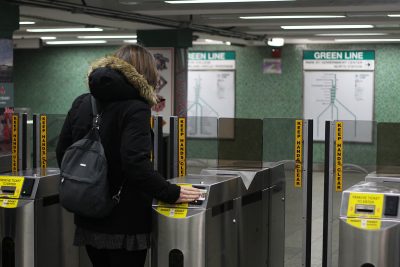Gov. Charlie Baker proposed Friday to reduce fees for Massachusetts Bay Transportation Authority fare evasion and prohibiting the arrest of those who try to slip on the T undetected.
The proposal, which will reduce fares from $100 to $10 for first-time offenders and from $600 to $250 for repeat offenders, has been pushed for by several social advocacy groups since the MBTA announced a new cashless fare collection system set to roll out in 2024.

The new cashless system will allow riders to pay fares at any door using a fare card, smartphone or contactless credit card, according to the MBTA website. Riders will also be able to use the same fare card for the T and commuter rail.
Collique Williams, an organizer for Community Labor United, a group that works with community-based organizations and labor unions to advocate for low-and middle-income individuals, said Baker’s proposal is progressive.
However, he said, there is still room for improvement.
“We think it’s a step in the right direction,” Williams said. “The fine for fare evasion still does need to be lowered. The reality of the situation is that if you’re hopping the fare gate or doing something in that nature, it’s more than likely you don’t have $250 to pay that fine.”
Baker’s proposal, part of a supplemental budget plan, comes after advocates voiced concerns that minority groups may be disproportionately targeted by transit police who will more frequently verify passengers’ payment after the new cashless fare collection system is in place.
Williams said allocating a separate agency to enforce fares could help prevent racial bias.
“Something that we’ve been pushing for is not to have armed police officers being the ones that are administering fines for fare-evasion,” Williams said. “We think it should be a different agency.”
Jarred Johnson, chief operating officer and development director of public transportation advocacy group TransitMatters, said Seattle could serve as a possible model for Boston public transportation as the MBTA works to make it more accessible to low-income individuals.
“In Seattle, for a first-time offense, they enroll you in a low-income fare policy if you meet those qualifications,” Johnson said. “I know the T is looking into implementing a low-income fare, and that would be a great policy to institute.”
The current policies, Johnson said, prevent people with unpaid fare-evasion fines from renewing their driver’s licenses and are unnecessary.
“It’s completely unconnected and it punishes poor people from switching modes [of transportation], which is something that we want them to do,” Johnson said.
Mattapan resident David Ho, 26 said that the new gates at the entrances of MBTA stations have already reduced fare evasion.
“I wouldn’t say [people not paying fares] is much of an issue,” Ho said. “With the new machines that they put in place, it’s kind of harder to do now. The doors are really hard to break open with your hands, versus back in the day when you’re able to just slide under or go over.”
Takeo Rivera, 34, of Brighton said he thinks it’s complicated to meet the needs of lower-income individuals while making necessary improvements to the MBTA system.
“You have these certain two conflicting issues at the same time,” Rivera said. “You have the needs of the consumers but also the fact that the infrastructure is crumbling, and thus you need more funding and so forth. It’s a difficult balance.”




